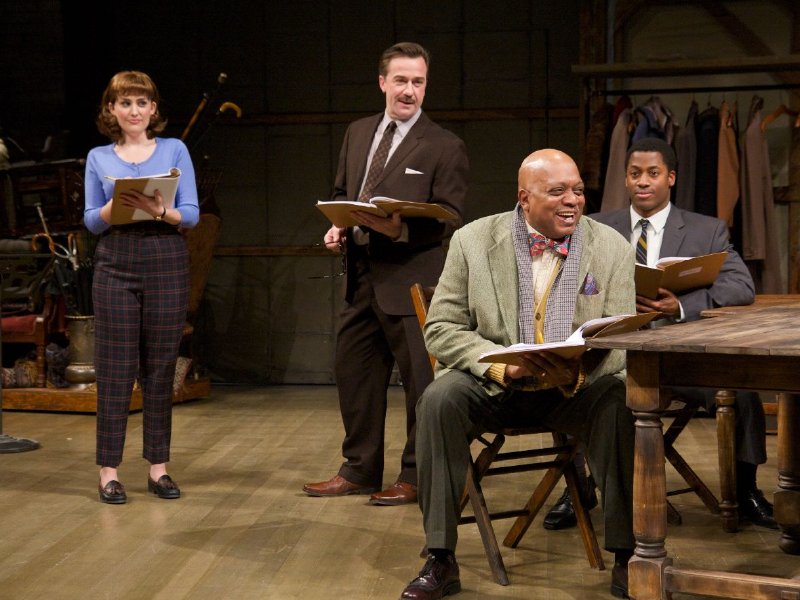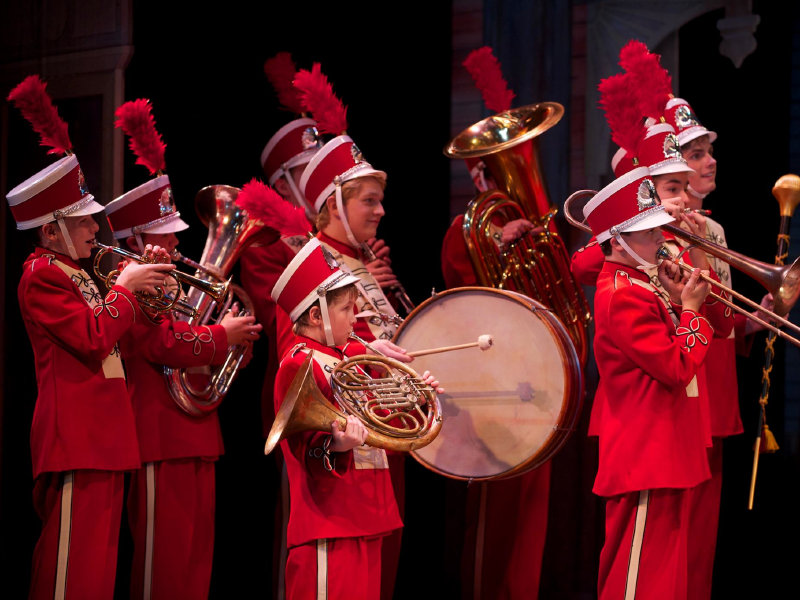On a warm Monday afternoon in August, while their peers were enjoying one of the final days of summer vacation, 101 children were swarming the Milwaukee Rep's usually calm offices. Accompanied by parents or grandparents, they had set their sights on becoming a street urchin, young Ebenezer Scrooge or a Cratchit kid.
December seemed a long ways away, but the Rep was beginning the sifting process that would result in putting 20 kids and teenager on stage to appear with the adult actors in its 36th annual edition of "A Christmas Carol." The production opened at The Pabst Theater last weekend.
The children, or more accurately their parents, had answered a general audition notice the Rep had circulated earlier in the summer. Associate artistic director Sandy Ernst and children's director Shawn Gulyas were going to make the first evaluation of the group, reducing to 25 the number of kids Joseph Hanreddy, the overall director of the production, would see at a callback audition three weeks later.
A few of the non-adults were already cast in Ernst's head. Three ensemble roles usually filled by acting interns were going to be played by teenage veterans of previous "A Christmas Carol" productions at the Rep. The interns were needed in the Rep's parallel production of "Next to Normal" in the Quadracci Powerhouse Theater.
Younger veterans who wanted to return for this year's show were also in Ernst's mind. The Rep likes to use children they already know if the previous experience with them was positive. Some kids who had small parts last year would be considered for larger roles.
The current production of "A Christmas Carol," the fourth version of the classic story the Rep has used over the years, is liberally laced with Christmas carols, and the company needs its child actors to have good singing voices. Musical director Randal Swiggum assessed the kids' vocal ability while children's director Gulyas worked with them in a rehearsal hall.
Divided into groups of about 15, the auditioners sat in a circle and introduced themselves, stretched their bodies, talked about favorite activities and what they had done for fun that day, and played theater games. The kids, who were as young as 6, were asked to sing a song of their choice while simultaneously miming an action. A little boy forgot the words to "Happy Birthday."
Each child was instructed to say "wow!" "Fill up the room," Gulyas directed. The kids were asked to dance, walk around the room and freeze.
Some of the children were barely engaged, and others turned on the sparkle to Broadway proportions. Ernst and Gulyas soaked it all up and huddled after each group was dismissed.
They were looking for poise, presence, and most importantly with this age group, focus. A 7-year-old girl twirled around the rehearsal hall with such untamed energy, she presented a potential problem. Energy is good but lack of discipline isn't.
Ernst and Gulyas compared notes on the children. "Good voice, but too self-conscious." "Focus is not his strong suit." "Sings well, seems to have poise." "She was brave and sang out."
The director coached them on their readings. "I want to hear your voice louder." "See if you can breathe a little deeper and expand it more, but keep it as honest as you did."
Some of the children would be cast as poor Dickensian street kids, and Hanreddy frequently coaxed them during the readings to "make it a little colder and a little hungrier." He told the auditioners to establish eye contact and listen to each other when reading lines together.
"Don't forget this a real conversation. It doesn't have to go fast," the director said.
Several veterans from last season spoke with the Cockney accent they had learned, and one of them looked and sounded like she was ready for opening night. "These kids kill me, man," Ernst said.
Musical director Swiggum had again listened to the children sing. "It's an embarrassment of riches," he reported to Hanreddy.
The competition was close among the young girls, and Hanreddy asked Gulyas to give them some theater games so he could watch them interact. One girl displayed a strong presence, but she was a bit hyper. "I'm pretty sure I can coach her to be still," the director said.
Offstage behavior can determine whether a child makes it into a cast. The kids, who get their own stage manager, spend a lot of downtime in rehearsals and in the Pabst Theater's basement during performances, and troublemakers cannot be tolerated. Hanreddy noted that a talented and exceptionally smart boy was not cast for a second year after causing headaches for stage management.
"Sometimes the group gels. Sometimes we will get kids who are fine in auditions, and then we get them in rehearsals, and they are nightmares," Gulyas said.
Costumes for "A Christmas Carol" are stored and reused annually, and after the group of children is chosen each year, the actual roles may be assigned according to the fit of the clothing. Hems and seams can be adjusted to a point, but the size of the kid must match the size of the clothes.
Tiny Tim can't weigh more than about 50 pounds because he must be hoisted onto the shoulders of adult actors. The 2011 cast, which ranges in age from 7 to 17, is physically smaller than average.
After being selected, the children attend three workshops conducted by Gulyas, where they analyze their characters, begin working on scenes, and bond into a unit. About three weeks before opening, the kids are folded into the full cast and rehearsal process.
By opening night last Friday, the kids' class of 2011 was a confident crew. The young actors showed only a few traces of nerves as they climbed into costumes, had makeup applied and got their hair done. Onstage, they were a polished group.
The same children who were a squirming and sometimes impulsive bunch in August were part of a well-oiled machine three months later. They did their jobs and took their bows.
"A Christmas Carol" runs through Dec. 24.
Damien has been around so long, he was at Summerfest the night George Carlin was arrested for speaking the seven dirty words you can't say on TV. He was also at the Uptown Theatre the night Bruce Springsteen's first Milwaukee concert was interrupted for three hours by a bomb scare. Damien was reviewing the concert for the Milwaukee Journal. He wrote for the Journal and Journal Sentinel for 37 years, the last 29 as theater critic.
During those years, Damien served two terms on the board of the American Theatre Critics Association, a term on the board of the association's foundation, and he studied the Latinization of American culture in a University of Southern California fellowship program. Damien also hosted his own arts radio program, "Milwaukee Presents with Damien Jaques," on WHAD for eight years.
Travel, books and, not surprisingly, theater top the list of Damien's interests. A news junkie, he is particularly plugged into politics and international affairs, but he also closely follows the Brewers, Packers and Marquette baskeball. Damien lives downtown, within easy walking distance of most of the theaters he attends.







